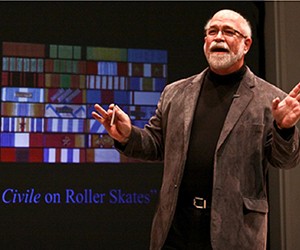Q&A with Scott Eberle, Vice President for Play Studies // The Strong National Museum of Play // Rochester, N.Y.
What are the fundamental elements of play?
Properly defined, play is a process that begins in anticipation, and with luck, ends in poise. Surprise, pleasure, understanding and strength of body, mind and society are the dividends that lie in between. If play that begins in curiosity or keen wonder doesn’t trend toward poise—in the direction of balance, satisfaction or fulfillment—it’s something other than play. Fairness is almost automatically built in to play this way. If individuals become domineering or bullying, the incentive to play drains away, and play stops.
How can play beneficially transform traditional workplace definitions?
Work shouldn’t be regarded as the opposite of play. When you’re really humming along and in the zone at work, either alone or with co-workers, you’re more likely to anticipate the pleasurable and rewarding surprises that lead in the direction of satisfaction. In fact, when work begins with the question “What’s next?” it promises surprises. Surprises spark creativity, even novelty, which in turn fuels productivity. Social science experiments proved this nearly a century ago, but the message is just now sinking in to management thinking.
Work always sets obligatory tasks before us, some of them routine, and, if “play” isn’t voluntary, it’s usually not fun. However, these should not inhibit managers from cuing up playfulness in the service of creativity, productivity and greater satisfaction.
What play-related programs does The Strong offer to groups?
The Strong’s dynamic exhibit spaces provide an excellent backdrop for free play and exploration, as well as teambuilding exercises of all types, including scavenger hunts and pinball machine challenges. The museum also offers a host of professional development opportunities based around the importance of play and learning that are ideal for educators and those in associated fields.



